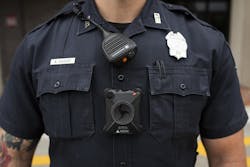Mass. police bodycam rules may keep footage from public records
By Chris Van Buskirk
Source Telegram & Gazette, Worcester, Mass.
BOSTON - Worcester lawmakers have signed on to legislation creating a task force to develop regulations establishing a uniform code for the use of body-worn cameras by law enforcement officers in the state and exempt the footage from public records.
At a July 11 hearing, lead sponsor Rep. Denise Provost, D-Middlesex, defended her bill from pushback from police groups who said a uniform approach to body cameras would not work because of different populations, crime rates and budgets.
The new task force will consist of 17 members, including law enforcement officials and civil rights advocates. The group must conduct at least five public hearings in various parts of the state as it works to write regulations for standard protocols and procedures for body-worn cameras.
A provision at the end of the proposed legislation would exempt recordings from body cameras, dashboard cameras or any similar devices used by law enforcement officers from the definition of public records. Sen. Michael Moore, D-Worcester, said there are a lot of issues surrounding body cameras that need to be addressed.
"That's why having a task force look into these issues is the best option. Rather than having the state just issue regulations or policies that aren't based on best practice or evidence-based practice," he said in an interview. "We really need to get voices from all the stakeholders."
As for the proposed public records exemption, Mr. Moore said citizens' constitutional rights are paramount.
"There are considerations, no disrespect to the media, I know the media wants this information as soon as incidents take place," he said. "We have to worry about people's constitutional rights, their civil rights, and if you have an incident that's recorded on a dashcam, or even through the police bodycam, there may be information that could pertain to the criminal case."
Mr. Moore provided the example of an officer responding to a domestic violence case. If officers rush into someone's house, he said, people may have claims that their Fourth Amendment rights were violated.
"This is again a situation where we are trying to adapt public policy to new technology," he said. "But also make sure we preserve the protections that are guaranteed to people as far as their constitutional and civil rights."
The Worcester Police Department recently instituted a body-worn camera pilot program for a group of 20 officers. Worcester police Lt. Sean Murtha said the cameras offer the department several beneficial uses.
Lt. Murtha said the cameras engender public confidence as people can see what the police are doing. The tool can also be used to de-escalate situations where an individual is getting worked up, he said. Sometimes, telling an individual they are on camera will calm them down. The footage is also helpful when resolving minor complaints and for training purposes.
The body-worn cameras activate after holding a button for a couple of seconds. Lt. Murtha said officers typically turn them on as soon as they get a call.
"The officers involved have been very positive about it so far," he said in an interview. "They feel like it protects them. They feel good about the cameras being there as it's recording everything that happens."
The Massachusetts Chiefs of Police Association released a statement in support of creating a task force to develop statewide codes for police body-worn cameras and their recordings. Chief Brian Kyes, legislative chairman of the association, wrote that the group is a strong advocate for transparency balanced against an individual's right to privacy.
"Therefore, as long as these recordings are taken in public view and would not adversely jeopardize any ongoing investigation we think that the presumption should be in favor of disclosure," he wrote in a statement. "Recordings that are made inside of a private dwelling or those involving a minor the presumption should be for non-disclosure unless there is a compelling public interest for such a release."
Rep. David LeBoeuf, D-Worcester, co-signed the bill so the emerging technology could be examined by experts from law enforcement and civil rights organizations. He said it is important to understand the nuances of body cameras and how the technology is affecting safety measures.
Mr. LeBoeuf said the public records exemption is really about protecting potential innocent victims that could appear in the background of videos. The purpose of body cameras, he said, is to provide evidence and to document interactions between individuals and police.
"There could be a crime victim that could be in the footage whose identity needs to be protected," he said in an interview. "At the same time, as we've been seeing with the way that the internet goes ... it's evidence, not entertainment."
The representative said he is open to looking at the language of the bill, as he is not adamant on exempting all police footage from public records law.
"I think we all want transparency. I think that's part of the reason why they're looking for uniform standards is to have transparency about how body cameras are being used and making sure that there is consistencies across police departments," he said. "At the same time, there needs to be some types of protections for victims."
Material from State House News Service was used in this report.
———
©2019 Telegram & Gazette, Worcester, Mass.
Visit Telegram & Gazette, Worcester, Mass. at www.telegram.com
Distributed by Tribune Content Agency, LLC.



